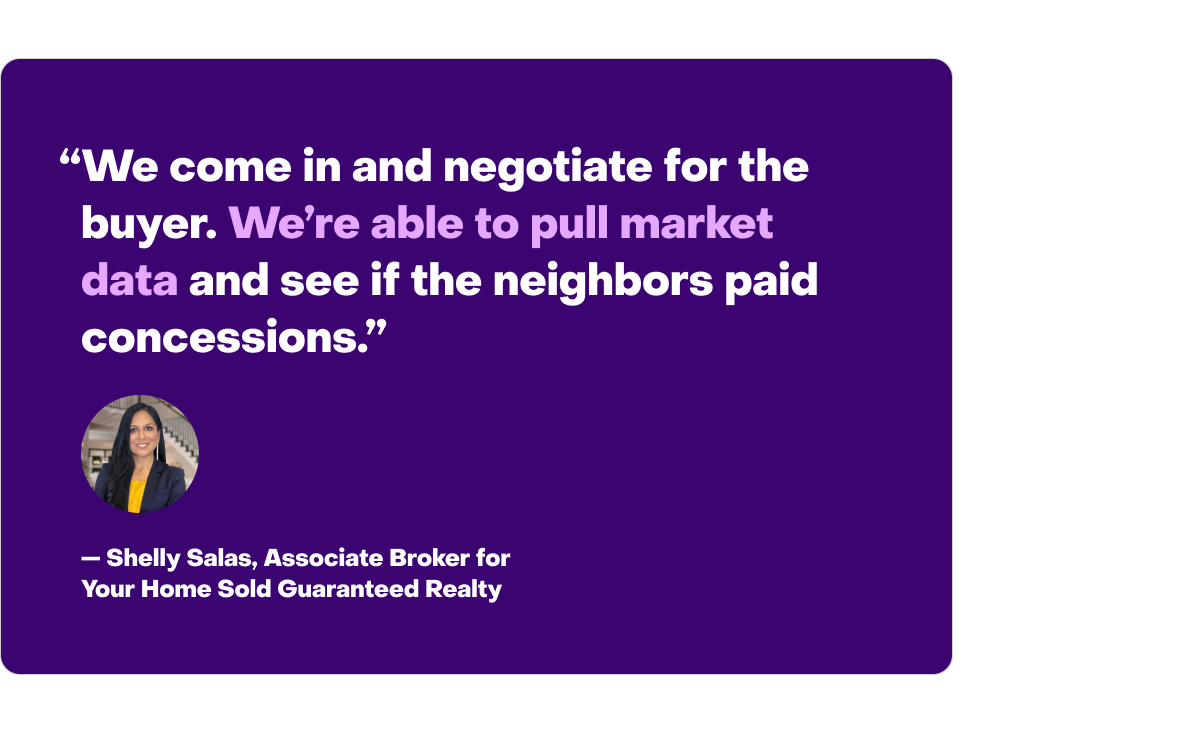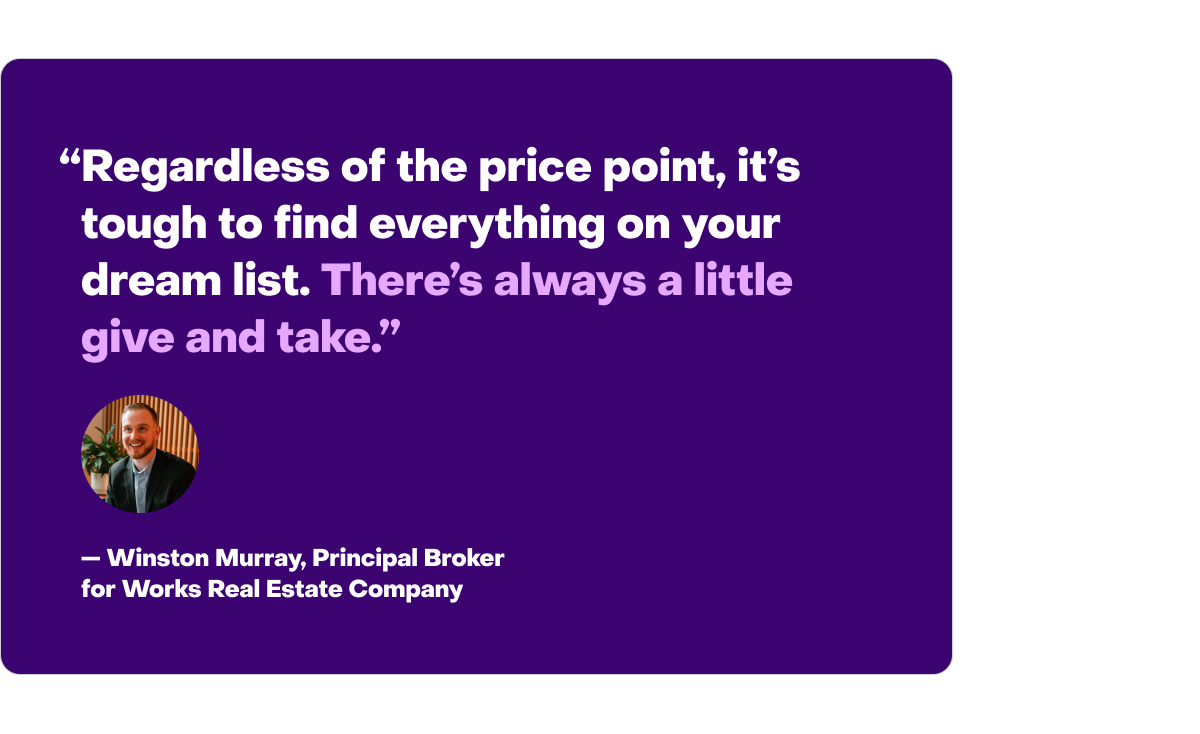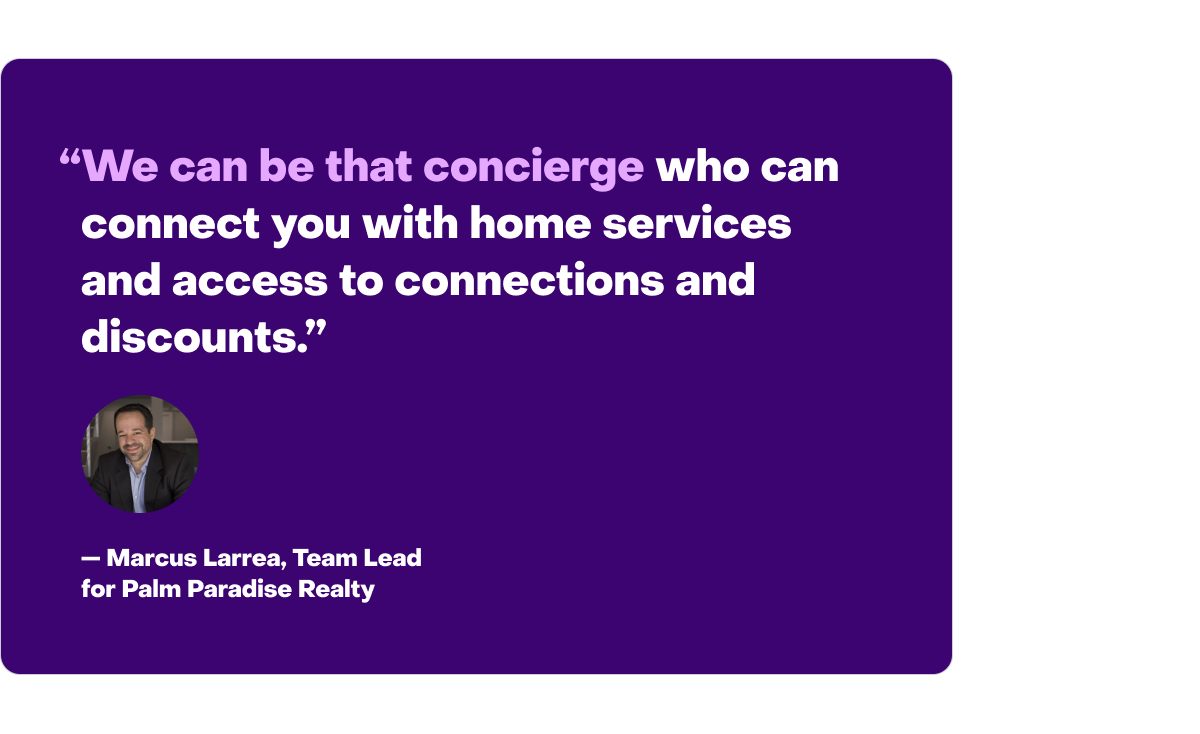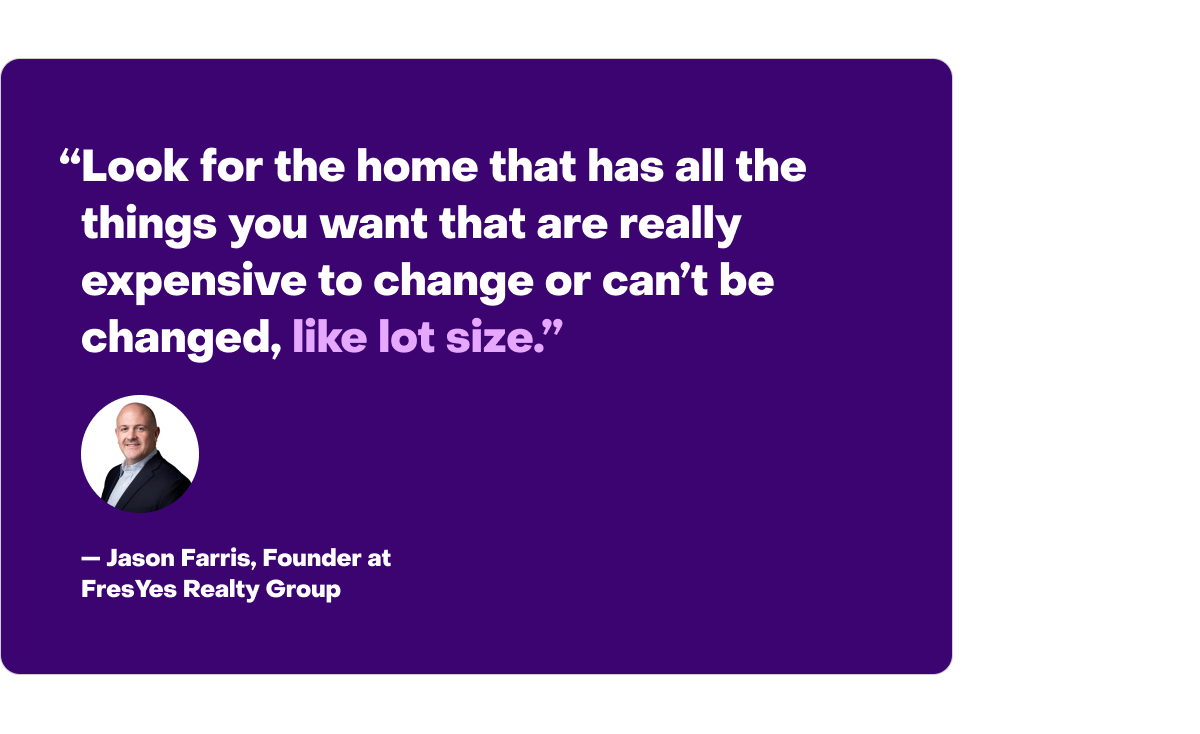When it comes to advice about buying a home, agents have first-hand knowledge. Four partner agents share their advice on staying on budget in a challenging housing market.

If you’re thinking of buying a home, you’ve probably already done some research and talked to family and friends who made their own purchases. While those nuggets of wisdom can help you as you consider homes to buy, you’ll also want to tap the experts — your real estate agents and lenders. We asked four partner agents from our Agent Advisory Board to share their top home buying tips to help you find a home that checks all of your personal boxes, including finding a home within your budget.
Here are 20 of their best tips to help you on your journey to becoming a homeowner, whether you’re searching in a buyer’s or a seller’s market.
1. Focus on houses that fit your monthly “comfort zone”
The first thing Shelly Salas, a broker with Your Home Sold Guaranteed Realty, tells her clients, she says, is to get pre-qualified from a lender so they know their purchasing power from the get-go.
“A lot of times, buyers don’t know what their budget is,” says Salas, who also leads The Salas Team in Killen, Texas. “So we start at the beginning, and ask, ‘How much are you paying for rent right now? Are you comfortable with that monthly payment? Can you go a little bit more or do you wish it to be a little less.’”
Once a buyer nails down their budget, she says, they can start to look at homes in their financial comfort zone.
“Just because you qualify for a $500,000 loan, are you going to be house poor? Are you going to be able to go to the movies? Do you want to be able to afford the house and not eat ramen noodles every day?” Salas says. “We want them to be in a comfortable scenario, where you can have the house of your dreams that’s within your comfortable budget, and still be able to do day-to-day activities.”

2. Explore government programs that can help with down payments
Government programs can help buyers get into the housing market, even if one of the buyers has previously owned a home. Salas said buyers whose spouse or partner has never owned a home can qualify for loans available only to first-time buyers as long as their name was not registered on the deed.
The programs include down payment assistance, low interest loans, grants, forgivable loans, deferred payment loans and other incentives that help lower the amount you have to borrow.
3. Take over payments on the seller’s low-interest mortgage
Salas, who works in a military town, said she’s seeing an increasing number of buyers who are able to assume Veterans Administration (VA) loans from sellers who financed at rates between 2% to 3%. Doing so can save buyers hundreds of dollars a month compared to current rates, which have hovered above 6% in recent months.
“If they qualify, they can assume the loan,” even if they’re not in the military, she says. “They’re able to take on that 3% or whatever the interest rate is for the remainder of the balance on the current homeowner’s loan.”
Most conventional loans are not assumable, but qualified buyers can assume loans insured by the Federal Housing Administration (FHA), and those backed by the VA and the U.S. Department of Agriculture if they meet certain conditions. Each loan type has its own rules, so be sure to check with the lender.
4. Negotiate concessions from sellers
Don’t assume sellers won’t negotiate, especially in a buyers’ market.
Salas says she’s negotiated concessions where sellers pay off solar panels, so the buyer owns them — and the house — free and clear. In one case, she says, the concession for the panels amounted to $60,000 in saved costs to the buyer.
“I’m surprised how many sellers are willing to budge on that,’’ she says of the solar concession. “As a buyer, you may go in, and because it’s an emotional purchase, you might say ‘okay’ if the seller tells you no. We come in and negotiate for the buyer. We’re able to pull market data and see if the neighbors paid concessions. If so, we can share that data with the seller, and say, ‘I know you’re saying you don’t want to pay for this, but let me show you what your neighbors did. It’s powerful.”
5. Find an experienced agent who has good customer reviews
There’s a strong case for connecting with an agent who has deep knowledge of the market where you’re shopping and as well as multiple strategies to help save you money on the sales price, closing costs, even home repairs and moving.
Salas, who hosts the Shelly Salas Real Estate Show on KTEM radio, says buyers should vet their agents for experience and success. Every market has its own dynamics, and the strategies you’d use to buy in a seller’s market will differ from those you’d employ in a buyers’ market, she says.
“A lot of agents sell one or two deals a year, and you, as a consumer who’s thinking about entering this market, really should do your research and look at the agent’s reviews and what other clients are saying about them,’’ says Salas, who offers buyers a guarantee: if they’re not happy with the home they bought, she will either buy it back from them or sell it for free.
6. Line up financing early so you’re prepared for different interest rate scenarios
“A conversation with a lender can be intimidating for some people especially if it’s their first home,’’ says Winston Murray, founder and principal broker for Works Real Estate Company in Portland, Oregon. “Having a three-minute conversation with a lender can provide a lot of initial clarity on your purchasing power.”
If you’re not quite ready to buy yet, Murray says, a lender can help you create a plan and give you some clear action items to ensure you’re in a strong position to buy in the future. “Getting clear on costs associated with the purchase will ensure more confidence going through the purchasing process,’’ he says.

7. Consider a fixer-upper versus a turnkey home
“Purchasing a fixer might help you get the location or square footage and layout you want without having to pay top dollar,’’ says Murray. “While there is value in having something turnkey ready, buyers pay for that convenience.”
But there are caveats when it comes to fixer-uppers.
Murray says lenders finance homes based on the home’s current condition, not how much it’ll be worth once you’ve improved it, so you’ll want to be sure the home is priced right. That way you’re more likely to qualify for a mortgage, and, ideally, have enough to afford the improvements.
“Make sure you have a vision for the space, and be mindful of your finishes to ensure cohesion through the space once it’s completed over time,’’ Murray says. “This will help with the resale value.”
He also recommends you assess whether you have the required skills and time to make the improvements. “If you’ve never restored properties before and it’s your first time, I recommend purchasing a cosmetic or light fixer,’’ he says. “Ideally this is something you are happy living in while doing small updates over time like light fixtures and paint, etc.”
8. Consider different home types, including new construction
“The more houses I sell, the more I like new construction,’’ says Murray. Builders often provide financial incentives for buyers, which can help lower your monthly payment and closing costs, and you may be able to work with the builder to alter some of the space or customize finishes to suit your tastes.
Still, says Murray, “not all new homes are created equal.” He recommends you check the builder’s reputation, the projects they’ve done, and customer reviews. If they’re a small builder, he suggests you look for evidence that they’re responsive and communicative before, during and after the sale, and check on any warranties they provide and whether all the permits are closed prior to their sales being finalized.
9. Know when to compromise on home features and desired neighborhoods
“Regardless of the price point it’s tough to find everything on your dream list,’’ says Murray. “ I’ve helped hundreds of home buyers, and there’s always a little give and take. It’s helpful to get clear on your search criteria and what you want to prioritize.”
For some people the location is the most important thing and for others just having the right layout or view is what matters most, he says. “If you aren’t finding the right house in the right location and the right price, I recommend you adjust your expectations about what you can get for the location or expand your search out geographically. Don’t wait too long for the right one as prices continue to rise. The up and coming area just outside of your search won’t have low prices forever.”
Knowing what features are must-have and which are nice-to-have can help you make those decisions.
10. Consider “house hacking” — buying a home with renters in mind, or buying a multi-family property
From a financial perspective, purchasing a multifamily home (up to four units) with an owner-occupied loan and living in one unit while renting out the others is one of the smartest first purchases, Murray says.
“It allows you to acquire an investment property with a relatively low down payment and interest rate while offsetting your mortgage payments by renting out the other unit or units,’’ he says. “While it might not be the space you want, it’s one of the best ways to keep your monthly costs down, allowing for more investments in the future.”
Murray says being a landlord isn’t always easy so he recommends that you consult with a landlord tenant law attorney to ensure you are handling all communication, leases and notices to the tenants correctly.
11. Keep on eye on homes that have lingered on the market
While new listings generate excitement and represent new possibilities, homes that have lingered on the market often deserve a second look.
“There’s opportunity in the homes that came on the market too high in price, have bad photos or are poorly staged or not staged at all,’’ Murray says. “Make sure you are looking out for the new inventory but also keeping an eye on older inventory. There is opportunity in both.”
12. Be aware of potential hidden costs
Different states, counties and cities have their own rules and ordinances, and knowing what they are — and how they could impact your home buying budget — is important, especially if you’re moving to a new state or locale, says Marcus Larrea, founder and team lead at Palm Paradise Realty, in southwest Florida.
“Something may seem affordable, but in reality, it’s not because of all the hidden fees and costs on the back end,’’ he says. These fees can include insurance costs in flood zones, condo reserves and special assessments.
“Certain properties may not be able to qualify for financing because of insurance issues or budgeting issues,’’ says Larrea. An experienced agent who is well-versed in those issues can help you factor in those costs of buying and head off problems before they surface, he says.

13. Bring a contractor to the home inspection
If you’re buying a home that needs repairs or updating, consider bringing a contractor to the inspection to give you an idea of what things might cost, Larrea says.
Your agent should have a stable of home improvement professionals who can give you an idea of what might be involved in improving the home and provide cost estimates, he says. “That way, you can start to have an idea at least of what the cost could be and budget accordingly,’’ Larrea says. “And if it’s not something you can do right away, maybe you can do it in six months.”
14. Tap your agent’s connections for professional discounts on needed repairs
Larrea says good agents can also connect you to tradespeople and supply stores that can provide discounts.
“We have a couple of different tile stores where we can get our clients a 15% discount, and we can connect them with plumbers who can put them on the priority list and maybe get a little bit better pricing,’’ he says. “We literally have ties with any service you would need for your home, and we can connect you with a couple of different options. We want to provide more value to buyers, and this is one area where we can step up and be that concierge, that guide, who can provide the home services and access to connections and discounts.”
15. Explore different loan types
Buyers have several options when it comes to financing. Even conventional loans can have varying requirements, depending on the lender, so it’s important to explore all your options with a loan officer, Larrea says.
It’s also important to stay abreast of market changes since they can affect financing. For example, when southwest Florida’s market was a strong sellers market, it was impossible to get an offer accepted with a Federal Housing Administration (FHA) loan — common for first-time buyers, Larrea says. “Now, they’re definitely coming back, along with seller concessions.”
16. Consider buying now and refinancing later
“A lot of people were waiting to buy until interest rates dropped, and, unfortunately, they’ve actually gone up because of the situation of (for-sale) inventory still being at relatively low levels,’’ Larrea says. “And even though interest rates are up, prices are still going up or staying flat in many parts of the country”
Buyers shouldn’t be intimidated by rates if they’re ready to buy, Larrea says. “Find something that meets your budget, and try to get into a house sooner than later. When the rates drop, you can always refinance.”
That said, buyers shouldn’t get so caught up in the excitement of buying that they take on too much. He advises his clients to buy a house they can comfortably afford.
“You don’t want to get into a situation where you’re house poor, or where you’re constantly stressed out because you have to make a mortgage payment,’’ he says. “Things happen. Make sure you have enough of a safety net. You don’t want to be in a situation where six months after you close on the property, you’re barely making your mortgage.”
17. Choose a home based on things that can’t be changed
Jason Farris, founder and author at FresYes Realty Group in Fresno, California, recently had a buyer who really liked a home, but wanted to pass on it because it didn’t have a dual sink in the kitchen. He says he explained to her that a home that has everything she wants is likely to come at a premium, and that she could always install a dual sink at the house when she owned it.
“Instead of waiting, and continuing to be outpriced by the market, look for the home that has all the things you want that are really expensive to change or can’t be changed, like lot size,’’ he says.
If a home doesn’t have things you want — such as sliding doors or certain finishes — you can do those down the line,’’ he says. “The housing prices are increasing to the point where homes are worth more in six months than they are today. So you can take some equity out later and do some of the things you want.”

18. Pay attention to lot size
During the early years of the pandemic, homeowners developed an interest in Accessory Dwelling Units, also called casitas or in-law units, that they could use as offices or make-shift classrooms.
Now, having extra space that can be used for multi-generational living, to house aging parents or to generate rental income has become important to buyers seeking to make ownership more affordable, he says.
“Lot size is becoming more important than house price because of this interest in ADUs,’’ he says. “We’re getting a lot more requests where people say, ‘Down the road, if I need to put a tiny house on this lot, can I do that?”
19. Cast a wide net when searching for homes
Farris said he looks beyond the Multiple Listing Services (MLS) — a main source for agents of for-sale homes across the U.S. — because not every home is listed there.
“I search the MLS, but I search on Zillow, too, because I recognize that there are out-of-town agents that list property in my market without going to the MLS,’’ he says. ”If you find a great agent, that agent should be willing to create some inventory when none exists. What I mean by that, is when someone tells me they want a four-bedroom, three-bath home with a pool, and they want it to be in a particular neighborhood, I can go into that neighborhood, and I can find all of the expired listings, not just from six months ago, but from two or three years ago.”
Farris says he approaches those homeowners to see if they’re still interested in selling at market value, and makes a pitch for his clients. Farris said he’s successfully used that strategy for clients many times.
20. Look for flexible spaces and cost savings associated with owning
“When someone is looking for four bedrooms, I start to look at three-bedroom (homes) that are oversized,” says Farris. “Because if it’s oversized, it probably has a floor plan that has a bonus room that’s set up as a den that we can turn into a bedroom.”
Farris says that a 2,000-square-foot home with three bedrooms usually has an extra room, and buying that home usually costs less than buying a four-bedroom home.
21. Weigh the costs of waiting to buy
It can take years — or even a decade or more in expensive markets — to save for a down payment. Depending on the rate of savings, buyers could be constantly chasing a dream if home prices continue to outpace their savings, he says. That’s why Farris advises buyers to look for ways to get into a home if they’re close to their goal.
“I’d rather find something that maybe doesn’t cross off as many boxes, or maybe they just need to borrow $10,000 if they’re $10,000 or $20,000 short from getting what they want, so they can get into a home and then let equity do what it does,’’ he says.
*The agents are all members of Zillow’s Premier Agent Advisory Board, a 27-member panel of agent partners who provide insights and industry expertise to Zillow.

